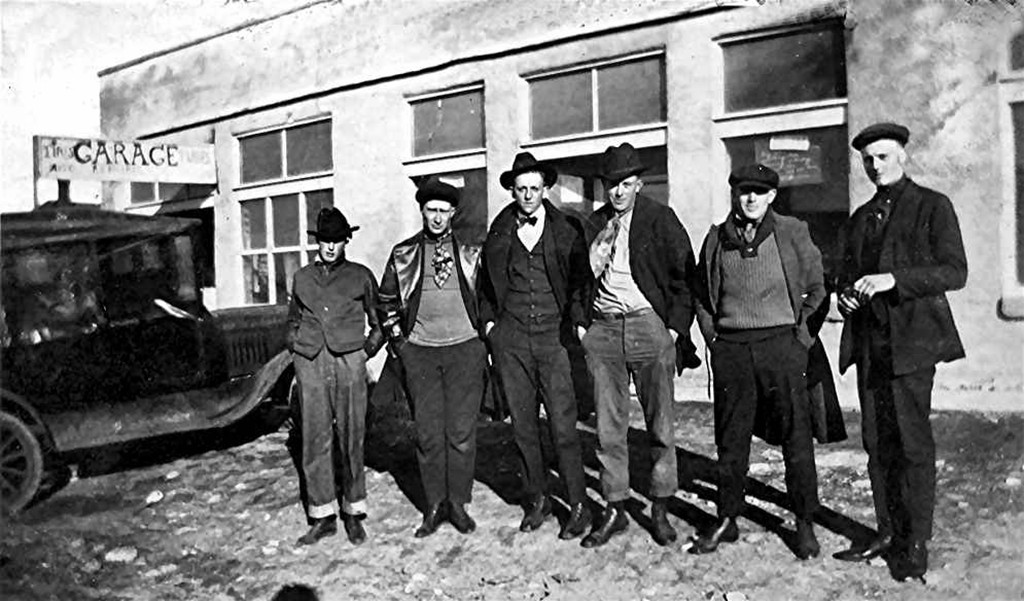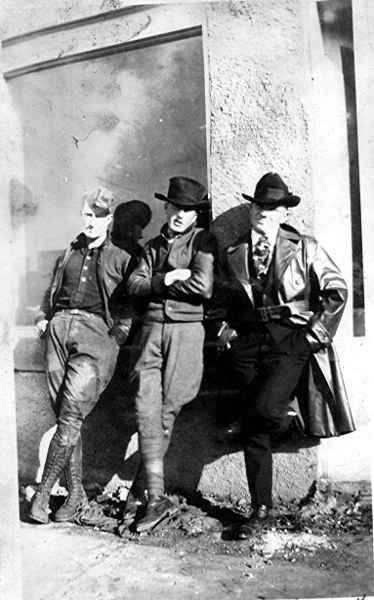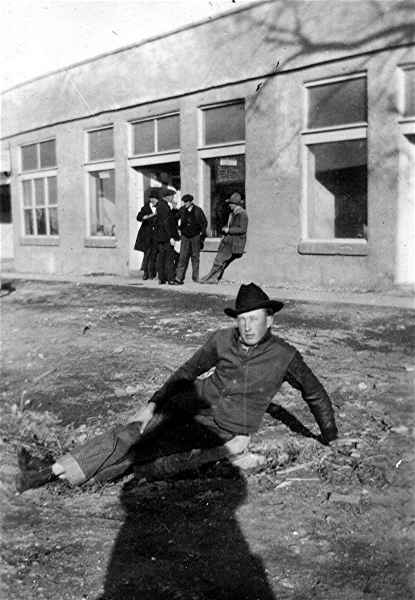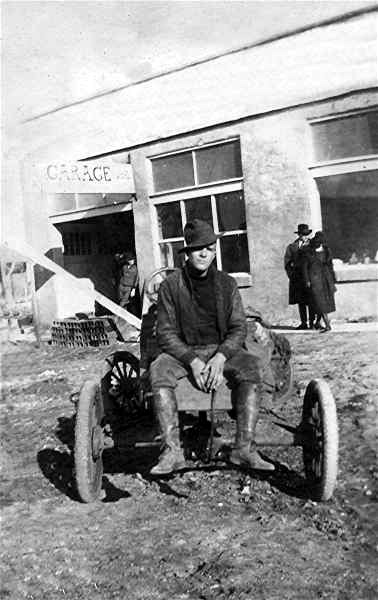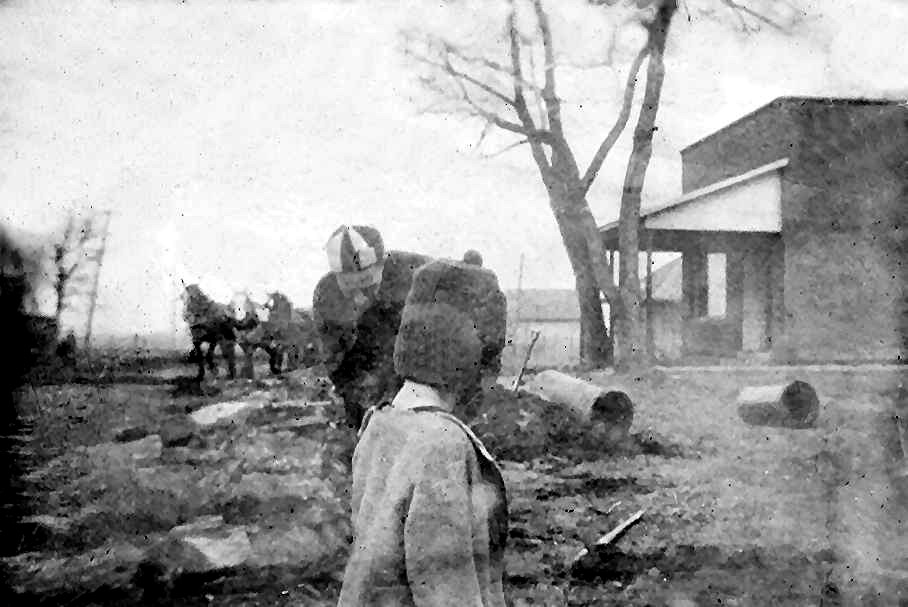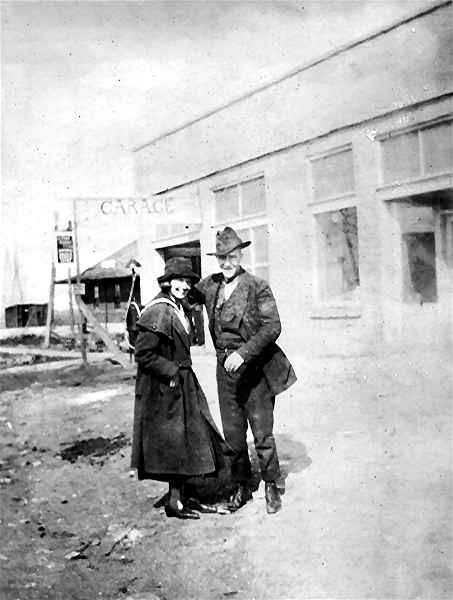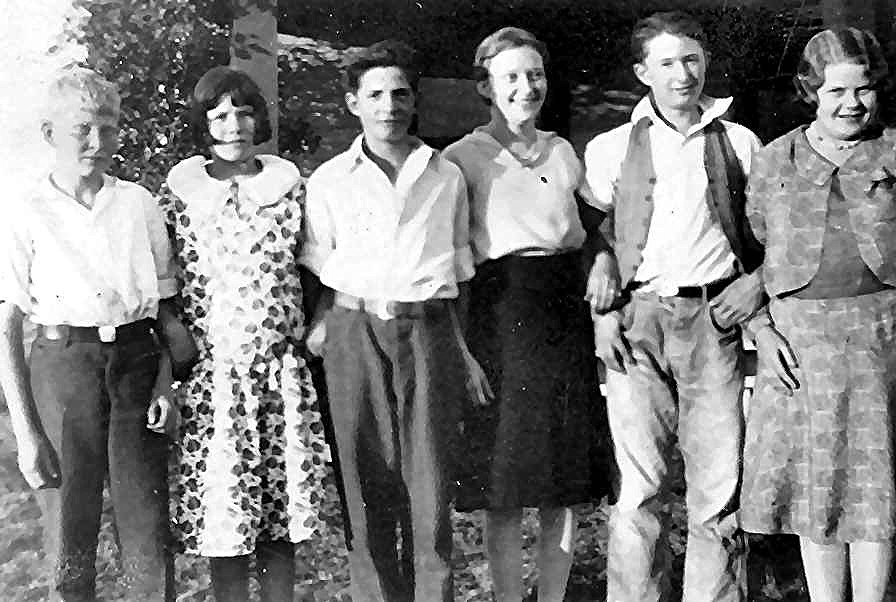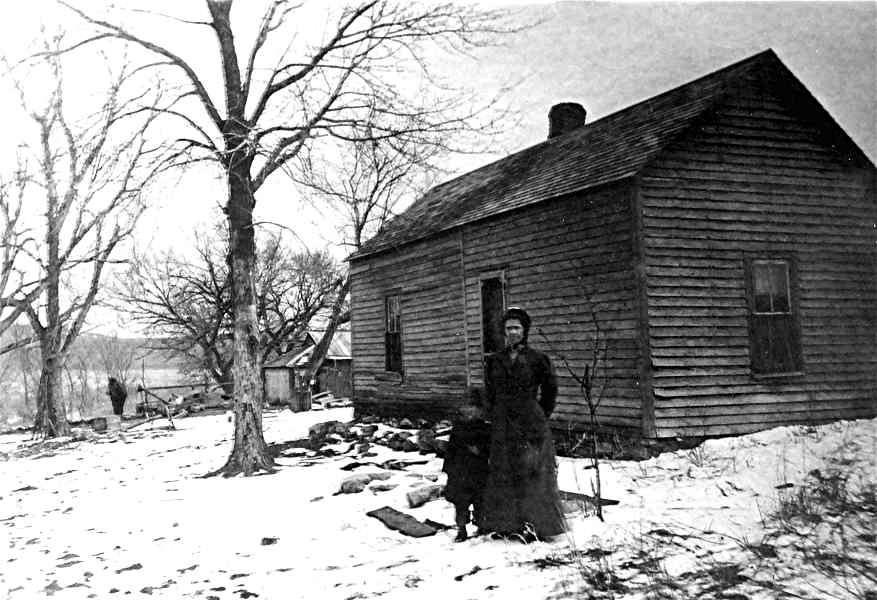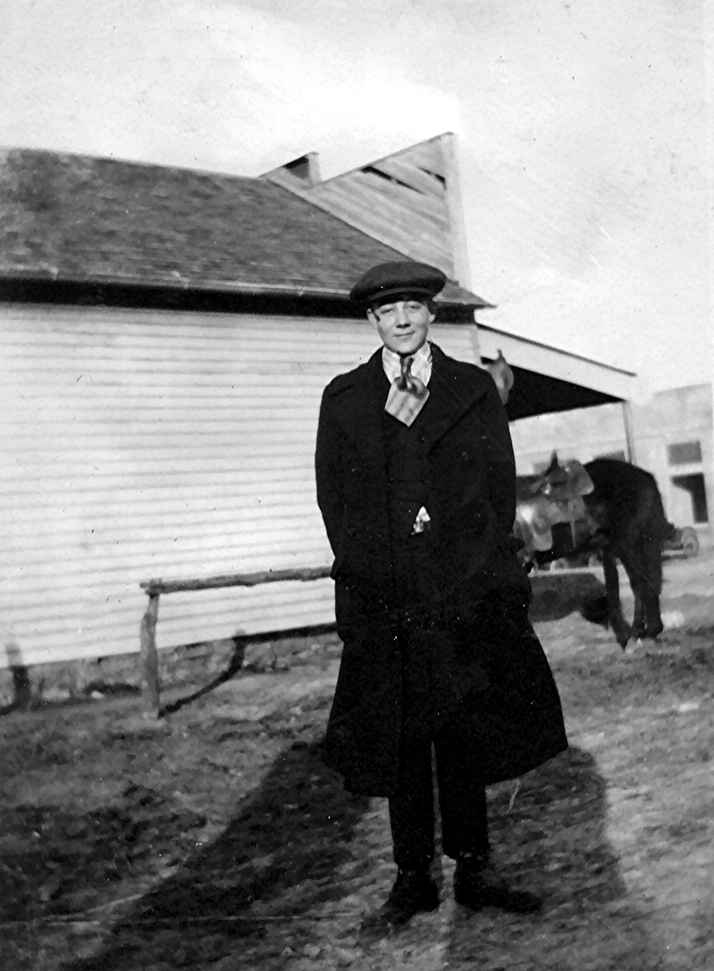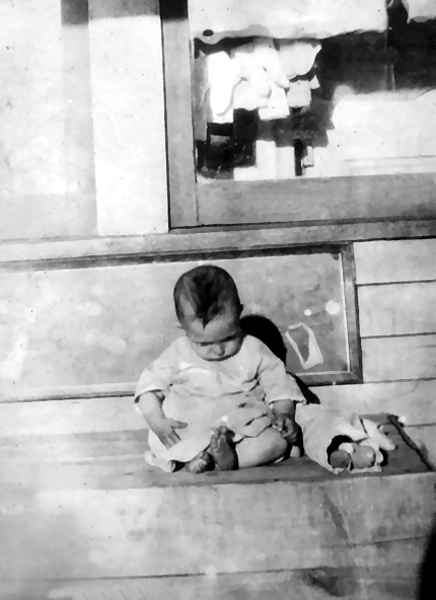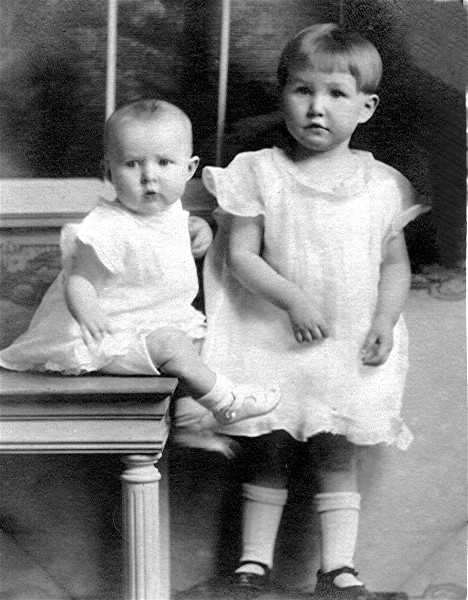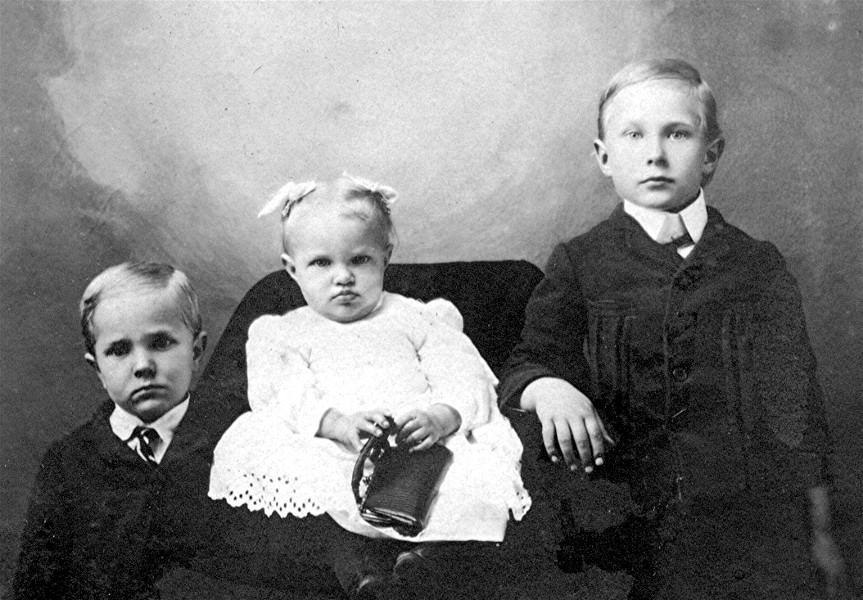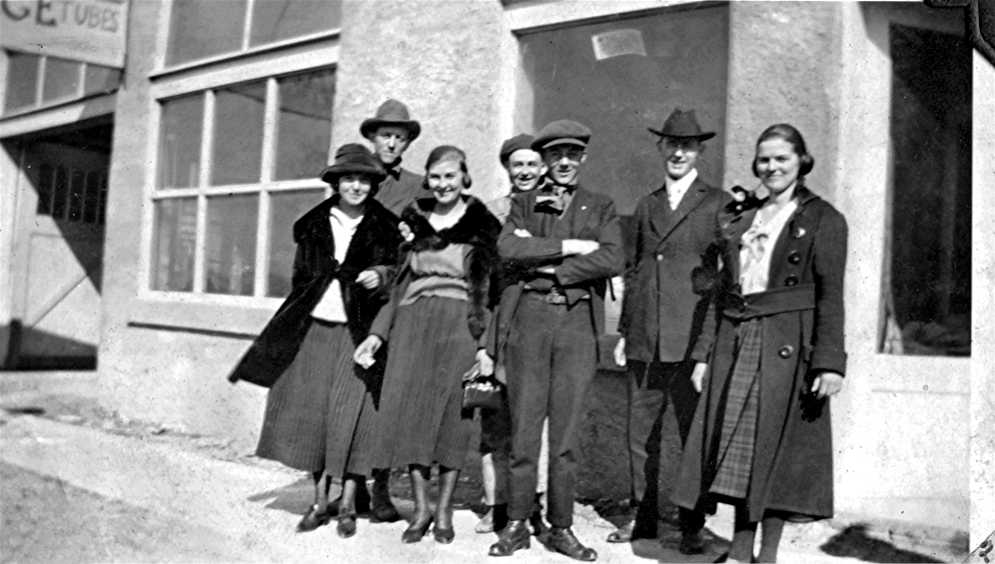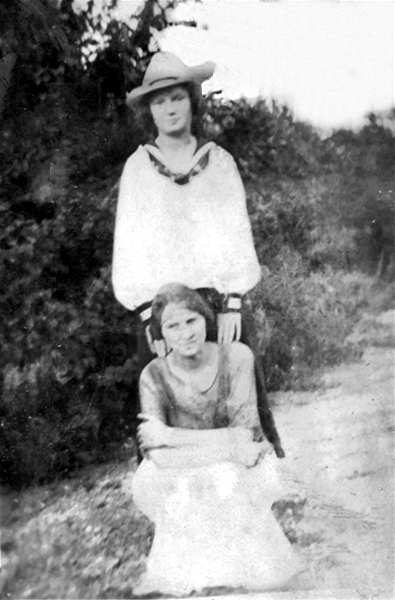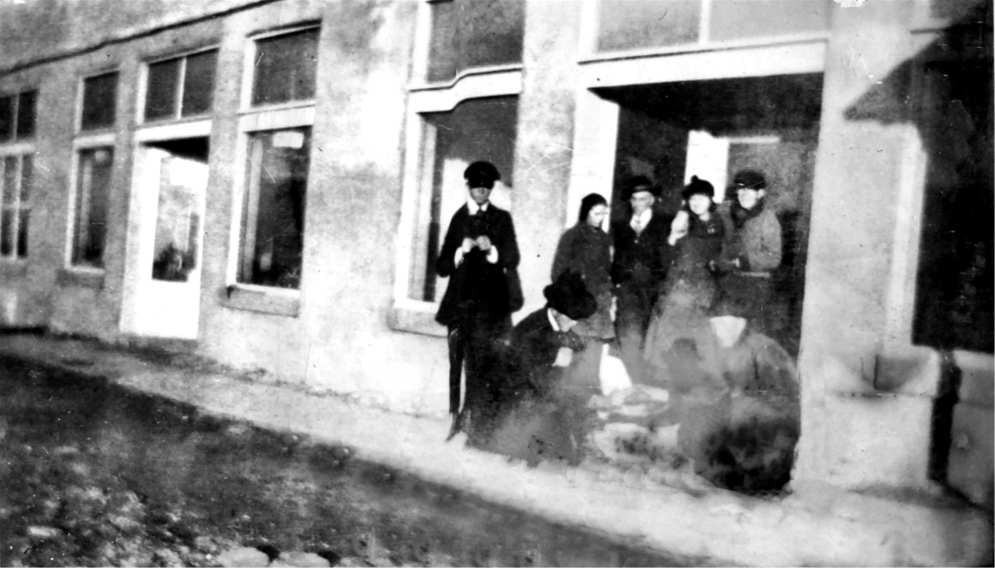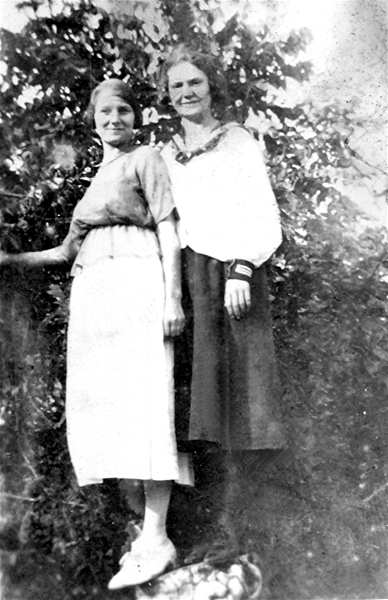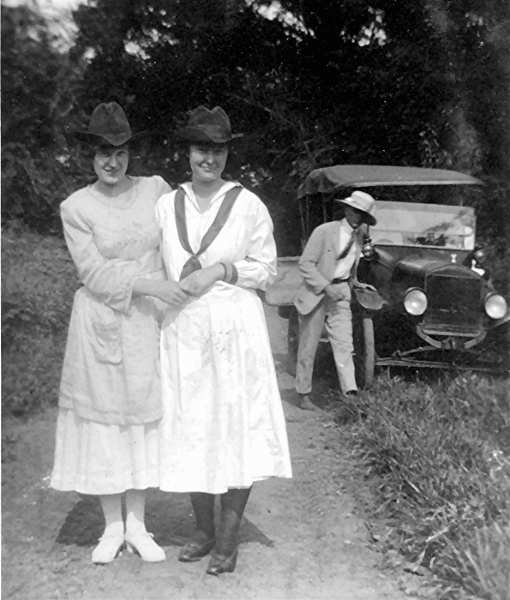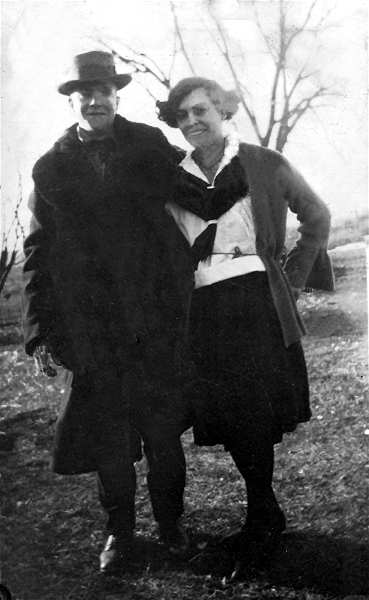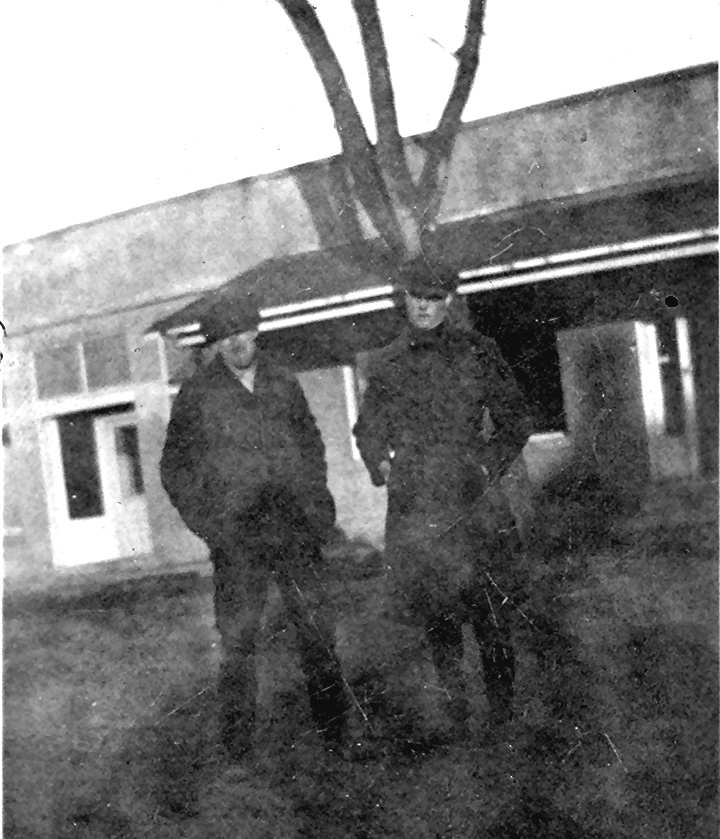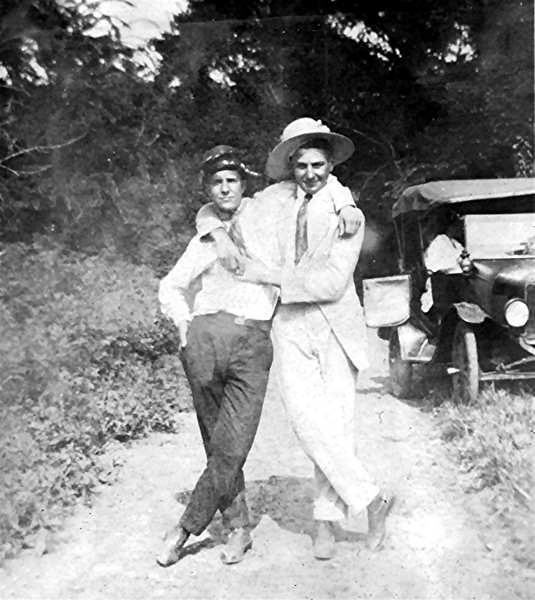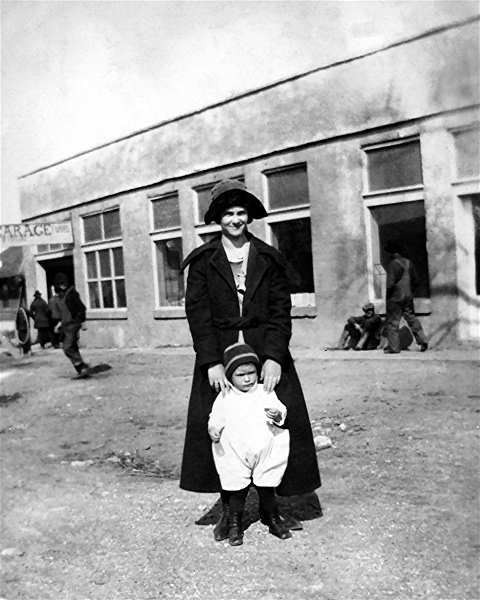This article
was written by me Marie (Eastman) Kelly the daughter of Thomas R. and
Maggie L. Eastman concerning some of the earlier happenings of my life
much of which has already been mentioned in previous writings, so for that
which I have repeated please bear with me.
I was the
youngest of the T. R. Eastman's children, two boys Thomas Arthur born Jan.
6, 1902 and Walter Francis born Oct. 28, 1904 and myself Mabel Marie all
born on the same farm 4 miles east and 3/4 mile south of Wilmot, Kansas in
Cowley County. I was born on Nov. 28, 1906 and we lived at the location of
my birth place until I was 4 years old, when we moved to the new home
which my parents had built on the adjoining land which they had recently
purchased. Though I was quite young when we moved from my birth place I
have a number of recollections of happenings while we lived there, but
among my most impressionable recollections was that our beloved pet dog "Karlo"
became rabid and attacked my father one night when he came from work but
my father managed to fight him off without injury to himself. The dog
wandered away during the night and hid himself under a bridge or culvert
on the main road near my grandparent's home and he was hunted down that
next morning by my father and other family members, and when found he had
to be destroyed. This incident made such a strong impression upon my young
mind that for years later when I would walk to my grandparents home and
would cross over that culvert I would tip toe lightly across with a fear
that there might be a mad dog under it, but as time went by fear of that
culvert grew dim and we had moved from that locality and thoughts of the
of the feared culvert had been erased from my mind until some 70 years
later, on March 15, 1980, while riding in a car with a friend Mary Lewis
on that main traveled highway as we were approaching that same little
bridge, or culvert a Bronco Jeep came from behind traveling at a high rate
of speed striking the car we were in, forcing it against the concrete
abutment of that culvert of which I had always had such great fear. The
concrete abutment was broken by the force of the impact and it was
necessary to use the jaws of life to remove my friend and I from the
wreckage and we were taken to the hospital at Winfield by ambulance where
my friend Mary died the next morning as the result of her injuries and I
was hospitalized for over three weeks with a broken, or shattered ankle
and other serious injuries, which took me most of that summer to overcome.
Once again
never cross over that bridge without thoughts of the fear of that culvert
that I carried through the years and the impact it has had on my life.
Back to my
childhood days. I was said to be quite frail when I first began my journey
of life. At that time they didn't know anything about immunization for
childhood diseases. So consequently I had most of the diseases common to
children of that day including scarlet fever, chicken pox, measles, and
whooping cough. At the age of 7 years old had what was then called
infantile paralysis now know as polio which left me somewhat crippled in
one foot and ankle and even though I had surgery on it some years later
which helped a lot, there has always continued to be a weakness there.
Those were
the horse and buggy days when there were no automobiles and we walked to
and from school about 3/4 of a mile and carried a lunch pail. Those were
the good old days.
Our school
was a little one room school which taught 1st through 9th grades to begin
with later teaching Primer through 8th grade. Ages ranged from 5 or 6
years old to sometimes 19 or 20. One teacher taught all grades as the
saying goes of "reading, ritin, and rithmetic" taught to the tune of a
hickory stick. Which to my way of thinking we need more of today. We
played games on the school ground at noon and recess if the weather was
nice and if the weather was bad we played indoor games and the teacher
most always joined in on our games.
We always
enjoyed walking to and from school with the other children going our way
and one of the special things that I remember about our school days was
that most always when we got home from school my mother would have a pan
of freshly baked hot rolls and home churned cow butter waiting for us to
snack on. A number of children who attended the Queen Village School where
I went were Eastman children, my brothers, myself and our cousins and we
had many happy times together. We thought of each other almost as though
we were all brothers and sisters. We were back and forth in each other's
homes most every day and often spent the night together.
On July 3,
1983 my older brother Thomas Arthur Eastman who had been in poor health
for quite some time passed away at the Good Samaritan Care Home in
Winfield where he had been a resident for some time. His widow Blanch Mae
Eastman continued to live on in their home in Winfield for a number of
years until in 1991 because of her health and her inability to care for
her home and herself she moved to a care home. She returned to her own
home for a time but was unable to stay alone so returned to the Care Home
where she continued to reside until entering the Newton Memorial Hospital
about three weeks before her death on Feb. 5th, 1993. Graveside services
were held at Highland Cemetery of Winfield on Feb. 8, 1993 beside her
husband who was also buried there.
Back to the
Thomas R. and Maggie L. Eastman family. On Nov. 29, 1922, I, the Eastman
's daughter Mabel Marie was married to Harvey Kelly, a son of Alice
(Groom) Kelly and the late Alexander Kelly, who like myself was born and
raised in the Wilmot community. He was a soldier in WWI and had only
recently returned from overseas, when I first met him. After several
months of courtship we were married and set up house keeping in the 2
front rooms of my parents home, which they often rented out as an
apartment. We lived at that location for about 3 1/2 years and in 1924 I
was stricken with typhoid fever after a return trip from Mountain Grove
Mo. Where we had gone to see Harvey's mother who was living there at the
time. I was hospitalized for a month as the result of this illness,
requiring special nurse care, which soon used up what little savings that
we had. Harvey at first after returning form overseas had taken a job of
operating a produce station in Wilmot buying cream, eggs, and poultry for
the A. S. Kinnamoth Co. of Winfield but had later taken a job as a section
hand working for the Frisco Railroad for $1.00 to $1.25 per day. This was
about the only employment in the area at that time except work as a farm
hand at $1.00 or less per day working from daylight until dark.
In 1926 we
rented a 120 acre farm at the edge of Wilmot called the Nicely place where
we had a few head of milk cows, some pigs, and chickens and farmed a few
acres of ground. Of course the farming was all done with horses at that
time, there were no tractors or power drawn machinery. We lived at that
location for a couple of years, then we moved to a smaller place at the
north east edge of Wilmot called the Fay Smith property where we kept a
cow for our own milk and butter, a few hogs for our own meat, and chickens
for our own consumption and to have eggs to use and some to sell and
Harvey again took a job at day labor. One of the very special things that
I remember while living at that location was that our milk cow had twin
calves and how excited we were about it and how much we enjoyed working
with our livestock.
In the Fall
or Winter of 1922 the Eastman's' oldest son Thomas Arthur was married to
Marjorie Alice Gleyne of Coy, Okla. Who was a school teacher at Alva,
Okla. At the time of their marriage and after completing her term of
school she came to Wilmot to be with her husband and they first lived in
the home of his parents the T. R. Eastman's until a home of their own
could be provided. During their stay in the Eastman home where they lived
for more that a year their first baby Rosalie Ellen was born on Oct. 2,
1923. Not long afterward they moved to their little 4 room house across
the street which had been moved in and remodeled and made ready for
occupancy where they lived at the time their second little girl Wanda
Louise was born on June 5, 1925. This little family continued to make
their home there until the death of the wife and mother on Nov. 6, 1936.
After her death Arthur and the two girls Rosalie and Wanda then moved back
across the street to the home of Arthur's parents. The girls finished
grade school at the Wilmot School Dist. 149 and were soon ready for High
School and college, which they attended in Winfield. Walter, the younger
son of the T. R. Eastman's had continued to make his home with his parents
and other family members through the years since he had not married
earlier in life and was good to do things to help his brother's two
motherless girls who were 13 and 11 years of age at the time of their
mother's death. Walter had worked at various jobs in the area until this
time then he and Arthur went into partnership farming for a time, renting
various farms and hiring other farm help. In the late 1920's the T. R.
Eastman's had sold their general merchandise and grocery stock to Mr. and
Mrs. Leroy Sturm who rented the store building from the Eastman's. The
partnership Lumberyard was sold to a new lumber business, which was being
built just south of the Wilmot Christian Church on Main Street. The garage
and service station was sold to Ernest Young who had moved to Wilmot from
Augusta during the early days of the coming of the Eastman oil field. A
man by the name of Bill Toms was the first operator of the new Lumberyard.
It was not long before her left Wilmot and Thomas R. Eastman was hired to
run the business which he continues to operate until its closing several
years later.
In the
Spring of 1929 my parents' 160 acre farm 3 miles east of Wilmot was in
need of a renter so Harvey and I moved there to begin farming operations
on a larger scale. My father Thomas R. Eastman and my husband Harvey made
a partnership arrangement for raising thoroughbred hogs along with our
farming operations, and raising cattle, poultry and etc. Of course our
farming operations were all done with horse drawn machinery at that time.
Our crops consisted mostly of corn, kaffin, and hay used mostly for
feeding the livestock and poultry. Farming was done in a much different
way in those days than the way it is done today. As much of the work was
done by hand. Kaffin was cut with a horse drawn binder, then shocked by
hand and later cut off with a header knife, hand operated from the side of
a horse drawn wagon and hauled to a granary and stored, or stacked to be
run through a threshing machine. The stocks were piled and used for
feeding livestock or sometimes the kaffin heads were cut off by hand with
a corn knife while standing in the field and then the cattle turned into
the stock field to graze and clean up the field before getting the ground
ready for planting a new crop.
Corn was
harvested in much the same way except the ears of corn were shucked from
the stock with a shucking peg and tossed into the horse drawn wagon and
hauled to the granary or piled in a huge wire bin for storage. Portions of
it were sometimes run through a hand-operated grinder for corn chop or
corn meal. The hay was cut with a horse drawn mover, raked and stacked or
put in the barn loft. We loved the farm work and the raising of our
livestock and poultry. We had no electricity at that time with no means of
heat for newborn baby pigs and we often carried them in the wash tub from
the furrowing pen to the house and warmed them by our wood burning heating
stove before taking them back to their mothers to nurse, and we often had
to bring newborn calves into the house to revive them from the cold in
extreme cold weather. Often we gathered up young chickens after a rain
that had gotten wet and chilled and carried them into the house and warmed
and dried them out in the oven, but those were all the good old days of
farm life.
As
previously mentioned we had no electricity and no refrigeration and of
course there were no radios or televisions. We used kerosene lamps for
lighting and kerosene, wood or coal for cooking and heating. Our washing
was mostly done by hand with a tub, washboard, wash boiler and homemade
soap and the clothes were hung on the line to dry. Clothes all had to be
ironed at that time and the irons were heated by setting them on the cook
stove. Water had to be pumped by hand from an outside water well and
carried into the house. A teakettle was a must for heating water. A
washtub was the only means of taking a bath and an outdoor toilet served
as the rest room and the toilet tissue was usually a Montgomery Ward or
Sears catalogue. I could go on and on about the things that we did or
didn't have but this was not a condition that existed for us alone, but
was a condition that all experienced alike at that time throughout the
country, as that was the only way there was and we were all happy with it.
One of the many things that we had to be thankful for was that we had so
many good relatives, neighbors and friends living close by. All working
together as each neighbor or person had need of. There was a family living
on at least every quarter section of land, and a rural school about every
two or three miles a part, and the children walked to and from school, and
the teacher boarded and roomed in the district.
The school
usually sponsored two or three programs a year for community entertainment
and persons of the community were all much as one big family always eager
to help each other. Many worked back and forth together at their farm and
homework. We boarded the teacher in our home a few terms of school during
the 1930's. As best I remember she paid us $20.00 per month for her room
and board from her teaching salary of $65.00 per month.
It was
during the 1930's that we had a great depression and an extreme drought,
when nothing was raised and there was nothing to feed poultry or livestock
and nothing for our own food supply. It was so dry that the dust blew and
piled great drifts much like the snow would drift. Drifts sometimes poled
as high as the barbed wire fences in certain parts of the country and in
referring to it, it was known as the days of the "Dust Bowl".
Because of
the drought and lack of anything raised, we were forced to sell much of
our livestock for practically nothing. There was no market for livestock
through much of the country because of lack of feed and the animals sold
to the government as a support to the farmer.
What feed
there was, was shipped from another state. This was in 1936, we got 50
cents a piece for 50, 60, and 70 lb. Hogs and $12.50 a head for some two
year old heifers, and we were glad to even get that for them because we
had nothing to feed them. It was necessary for us to just close our eyes
to this experience and start all over again. We both liked the farm life
and were both very much lovers of animals. We raised lots of chickens and
turkeys to sell and milked 10 or 12 cows by hand twice daily for a number
of years and separated the milk with a hand turned cream separator. We
sold eggs and cream each week for money to buy groceries and other
necessities. As time went along some advancements were being made in this
part of the country and we got rural electricity in 1951 and we bought an
electric range and an electric refrigerator and had our house wired for
electricity and had our first electric lights, a radio, electric iron and
etc., and also bought a used tractor to replace the horses at farm work.
We had begun to think that we just about had it made. But these new
conveniences only lasted for us on the farm a few short years, as my
husband Harvey dies on Oct. 27, 1954.
In early
1940 the T. R. Eastman's youngest son Walter started keeping company with
Mary Elizabeth Beeman of Winfield who was teaching school in nearby
Richland School Dist. 105 north west of Wilmot and they were married at
the home of her parents, Mr. and Mrs. Oscar Beeman in Winfield on Oct. 12,
1941. After a short honeymoon they set up housekeeping in a farm home 2
1/2 miles east and 1/2 mile south of Wilmot known as the Harrod ranch
which at that time Arthur and Walter were farming together. Soon after
this Arthur moved to Winfield and got a job working at Boeing Aircraft Co.
in Wichita commuting back and forth from his work to Winfield. On Feb. 21,
1943 he married Blanch M. Tucker of Winfield who was also working at
Boeing in Wichita. They had bought and furnished a home in Winfield to
have in readiness for their moving into after their marriage. In the
spring of 1943 Walter and Mary moved from the Harrod place to the Henry A.
Eastman farm nearby which had been vacated by Bill and Dorothy (Eastman)
Hiatt and family who had moved to Winfield as Bill was also employed at
Boeing Aircraft Co. and this made it handier for him to commute with other
riders to work. On Dec. 11, 1943 Walter and Mary became the proud parents
of a baby boy Thomas Beeman Eastman. Arthur's tow daughters Rosalie and
Wanda now both grown up had been attending college at Southwestern in
Winfield and Rosalie took a job of teaching school at Queen Village Dist.
19 east of Wilmot in 1943. Wanda who was still a student at Southwestern
had met John C. Young of Protection, Kan., another student there at the
college. They became engaged and were making plans for marriage and upon
John's graduation from college there, he was called into service. So on
Feb. 19, 1944 they were married in Winfield with Walter and Mary
accompanying them at the altar.
On Aug. 12,
1946 Arthur and Blanch had a baby boy whom they named Dale Arthur.
Before the
year of 1944 was over Rosalie decided to give up teaching and she too took
a job at Boeing Aircraft in Wichita. Wanda also took a job there during
John's absence overseas. Service men began coming home in 1945 and 1946
and while in Wichita, Rosalie met and fell in love with one of the retuned
service men Bill G. Spencer of Valley Center. On Sept. 22, 1946 they were
married at a small church wedding in Winfield and a reception was held at
the home of her sister Wanda and her husband John, who had also recently
returned from service and they were now making their home in Winfield. On
Feb. 22, 1947 Walter and Mary's baby girl Susan Mary was born.
Along with
some of the special interests and activities of the T. R. Eastman's
besides those previously mentioned was gardening in a big way and canning
as well as raising chickens, geese and ducks. They also kept a milk cow,
which supplied them with milk and butter and often had some to sell. Over
the years Mrs. Eastman served meals to a number of persons who needed
board and room and they often had persons who made their home with them.
Mrs. Eastman also wrote Wilmot news for the Winfield Daily Courier as well
as writing poetry and doing fancy pen drawings and writing which she was a
pro at. She also collected rocks and arrow heads and was custodian of the
Wilmot Christian Church and kept up the yard as well as the indoors. She
also took part in numerous organizations and social activities. My father
tripped and fell during an excursion at the home of my brother Walter one
day during the early 1940's at which time he received a broken hip. In
1949 he had to have a leg amputation because of diabetes and was somewhat
handicapped by having to use crutches his remaining years. But did quite
well with an artificial limb and lived to be 86 years old. One of the
later business activities performed by the Eastman's was the operation of
the Wilmot Telephone Office. Thomas R. was president of the Telephone Co.
and in the early 1940's the switchboard became in need of an operator so
it was moved into the Eastman home where they together operated it as a
switchboard and public telephone until 1957 when the Bell Telephone
Company came in to operate both long distance and rural lines. The Wilmot
Telephone Company was dissolved.
The Thomas
R. Eastman's celebrated their Golden Wedding Anniversary on Feb. 20, 1948
at a big celebration held for them by their children and grandchildren at
the Wilmot Community Center where special entertainment was furnished by
members of the community and a banquet dinner was served. On the following
day a family dinner was held at their home at noon before an open house
held in the afternoon. The occasion also celebrated the 5th wedding
anniversary of the Eastman's son Arthur and his wife Blanch whose wedding
anniversary was Feb. 19th. It was also the 1st birthday of the Eastman's
little granddaughter Susan Eastman whose birthday was Feb. 22. Over 200
guests attended the celebration.
Rosalie E.
and her husband Bill G. Spencer who had made their home in Wichita since
the time of their marriage, became the proud parents of their first born
son Stevan George on Dec. 28th 1949. Soon to add to the joy of the
Spencer's was the birth of their second son William Arthur who was born on
May 11, 1951. At this time all seemed to be joy and happiness in our
immediate family, until the early Spring of 1954 when it was discovered
that my husband Harvey Kelly was a victim of Hodgkin's Disease which was
known to be an incurable disease, cancer of the lymph glands, and he
lingered between life and death in and out of the hospital throughout the
summer months, and succumbed to the disease on Oct. 27, 1954, which made a
great vacancy in my life. I went back to live with my parents Thomas R.
and Maggie Eastman in Wilmot but continued to keep my cattle on the far
and I drove back and forth to and from the farm daily to feed and care for
them each day for the next 25 years before selling my herd and retiring in
1979.
Back to
other happenings within the family, on Apr. 18, 1957 another baby boy
Timothy Alan came to bless the home of his parents Rosalie and Bill
Spencer.
In
the early 1950's Wanda and John Young moved to Renton, Washington after
being transferred there from Boeing in Wichita. They had no family at the
time of their move there but on Nov. 15th, 1957 their first little boy
John Carl Young II was born. Then in 1960 the Young's 2nd son David
Patrick was born, and then just two years later their twins Thomas Alan
and Theresa Ann were born on Sept. 28, 1962 they were at that time living
in Bellevue, Washington where they have continued to make their home.
In 1956 my
brother Walter and his wife Mary and their two children Tommy and Susan
moved from the Henry Eastman's farm into Burden where Mary was employed as
a teacher in the High School there. Walter was employed at various jobs in
the area and then took a job of custodian of the school.
In 1961 it
was necessary that my father Thomas R. Eastman again have major surgery
and as a result he passed away on June 29, 1961 and was laid to rest in
the Wilmot Cemetery. My mother Maggie L. Eastman and I continued to reside
together in the family home in Wilmot caring for each other, and I looking
after my cow and calf herd on the farm.
In the
summer of 1964 my brother Walter and his wife Mary and daughter Susan
moved to San Andreas, California. Mary was to teach in the High School
there that fall and Walter to be custodian and their daughter Susan would
graduate from High School the following spring. Their son Tom was in
college at Emporia, Kansas and made plans to finish there and to continue
with farming operations on the Eastman family farm the remainder of the
summer before going back to college making his home with his grandmother
Maggie Eastman and his aunt Marie during that time. Soon after his
graduation from college he was inducted into military training and was
sent overseas. Not long after the family had moved to California my
brother Walter learned that he had incurable cancer but was able to
continue with his work for a time and still clung to life until after his
son Tom returned home to California from overseas. He, Walter, passed away
on Sept. 12, 1970 and was brought back to Kansas for funeral services at
Burden and burial in Wilmot Cemetery.
My brother
Arthur's son Dale was married to Barbara Cochran at that time and on Dec.
6, 1970 they became the proud parents of a baby girl Karin Ann. Not long
after this new little member was added to the family an older one was
taken away when on Jan. 27, 1971 my 93-year-old mother Maggie L. Eastman
passed away. She was laid alone in the family home in Wilmot, still
looking after my cattle on the farm for my livelihood which I continued to
do until the Fall of 1979 when I more or less retired after selling my
entire herd of both cows and calves.
My brother Walter's widow, Mary,
their son Tom and daughter Susan continued to make their home in
California and on June 19, 1974 Mary was married to Joseph Storti also a
resident of California. The following year the son Tom and Maura Ann Grady
were married on July 19, 1975, establishing their home in the Oakland
area. Later moving to Fortuna, California to operate a nursery, green
house, and floral shop which they had purchased there and where their baby
daughter Amy Therese was born on Sept. 23, 1985. They later established a
residence in Ferndale still operating their business in Fortuna.
Some of the happenings that have
brought about great changes in the little town of Wilmot, Ks. Which had
been my home these many years was the development in the late 1960's and
early 1970's of the Winfield City Lake on Timber Creek just one mile from
Wilmot as a reservoir for a water supply and public recreational facility.
for the City of Winfield and other surrounding areas as well as a rural
water supply.
On August 25, 1975 the little town of
Wilmot was struck by a tornado which practically destroyed the whole
residential area along with other buildings and trees. I was in my home at
the time and noticed a very black cloud gathering in the south west and
just thinking we were going to have a hard shower of rain, I went about my
duties in the home then suddenly it began to rain real hard and to hail
and the wind was blowing and beating the rain under the door of the
glassed in porch and immediately I began trying to mop it up but seeing
that this could not be done and realizing that it was dangerous to be in a
room with so much glass where the wind was blowing so hard. I went back in
the main part of the house and suddenly the storm struck with all its fury
and I realized that it was a tornado. I could feel the pressure of the
wind actually shaking the house and I was expecting it to collapse
momentarily and the windows began breaking all over the house, and trees
snapping and crashing all around the house all over the yard and objects
of all kind flying through the air. I managed to get down between the bed
and the wall in the front bedroom where I laid flat until it was over.
Nearly every house in Wilmot was badly damaged, others completely
destroyed. Portions of furnishings from other homes were picked up in the
yards of neighbors from several blocks away and load after load of debris
picked up and hauled to the dump. But fortunately no one was hurt. Many of
the residences were repaired and some replaced by new ones and some
continued to remain as they were.
Among the repairable ones was the
Eastman family home where I lived and after having it repaired and
everything cleaned up, I was soon back to living a normal life again, and
it was pretty much the same for others. And things were pretty much the
same for members of our family elsewhere, all living a normal life.
In 1973 Dale Eastman and his wife
Barbara had divorced and on October 11, 1975 he and Betty Ann Muret both
of the Winfield area were married. On November 16, 1977 their first baby
girl Sharon Diane was born and on September 28, 1981 their second little
daughter Kelley Dawn was born.
On March 14, 1980 Stevan Spencer
(oldest son of Rosalie and Bill Spencer) was married to Georgia Frentz
Major who had two sons by a previous marriage whose names were Eric and
Scott. On November 20, 1982 a new member was added to their family when
Kimberly Danielle was born at Gretna, La. where they lived.
On June 20, 1981 Timothy Alan Spencer
(the youngest son of Rosalie and Bill Spencer) was married to Barbara
Marie Henderson of Garnett, Ks. They established a home in Oklahoma City
were they were both employed. While living there their first son Timothy
Alan Jr. was born on November 18, 1982 and their son Matthew Lee was born
on August 3, 1985.
On March 15, 1980 I, Marie Kelly had
accompanied a long time friend Mary Lewis also of the Wilmot community on
a motor trip to Burden when in less than four miles from Wilmot when the
car we were in was struck from behind by a Broncho Jeep traveling at a
high rate of speed which fatally injured my friend Mary who was the driver
of the car and I was hospitalized for more than three weeks as the result
of a broken ankle and other serious injuries sustained, and I was most of
the summer of 1980 recuperating. Fortunately I had many good neighbors and
friends nearby to help me.
As previously mentioned I (Marie
Eastman Kelly) had continued to live on in the property in Wilmot which
had belonged to my parents and had been given to me by other members of
the family after the death of my parents.
On July 9, 1988 while sitting at home
alone late one afternoon or early evening during a thunderstorm I heard a
great crash of thunder and was convinced that lightening must have struck
something close by but upon investigation I found nothing. But soon I was
believing I could smell smoke, then thought that perhaps it was just
imagination, then almost instantaneous the smoke alarm went off and then I
knew it was not imagination. And as I stepped to the dining room door near
where the alarm was sounding I discovered that the smoke was pouring out
of my bedroom and that the house was filling up fast with smoke and that I
would have very little time to get out. I grabbed the telephone and dialed
911 and told them of my plight and how for the Fire Dept. to reach my
home, then I grabbed my purse and my little Poodle dog (Sam) which were
both nearby and the only things I had time to rescue. And I got out as
fast as I could even though it seemed like a dream and that it couldnít be
true. As I went out through the porch and the back door, I could see the
flames leaping up the curtains on the window which opened on to the porch
of which I was going out, realizing that I had little time and way to
escape. The lightening had come in on an electric line attached to an
electric clock beside my bed. Thanks to 911 and the prompt and ever so
efficient quick actions of the Winfield, Atlanta, and Burden Fire Depts.
much of the most serious actual fire damages were confined to the bedroom
which was completely gutted, along with some actual fire damage in the
dining room and extensive fire damage to the attic and heat and water
damages throughout the house. But with endless hours of labor and help by
my niece Rosalie and her husband Bill and their family and my good
neighbors and friends who helped me through it all, much of the contents
were salvageable and we moved it to a vacant house there in Wilmot where I
batched and worked much of the remainder of the summer cleaning things up
for a sale which was held in the yard of the once family home on Sept. 24,
1988. The house in Wilmot in which I was then staying had neither bathroom
facilities, water or means of heat and only limited electricity, so it was
necessary for me to find a place to live before cold weather, and after my
sale I spent much time at the home of my niece Rosalie and her husband
Bill and they transported me back and forth from Wichita to Winfield
almost daily while looking for a property that I would be satisfied in
buying for a home. And on Oct. 2, 1988 I decided on a property at 407 E.
12th St. in Winfield and we finalized the deal on Oct. 28 and
moved in on Oct. 30 and 31 and started life in my new home on Nov. 1, 1988
using much of the furniture that had been salvaged from my home in Wilmot,
along with a few new added pieces and appliances, and gifts by family
members and friends.
On Feb. 20, 1986 Susan Mary Eastman
the daughter of Walter and Mary was married to Robert McKendrick both
living in the San Francisco area of California at the time of their
marriage. Their wedding date was also the date of which would have been
Susanís grandparents Thomas R. and Maggie L. Eastmanís 88th
Wedding Anniversary.
Later in the year of 1986 on Nov. 8
Teresa Ann Young daughter of Wanda L. and John Young of Bellevue,
Washington and the great grand daughter of Thomas R. and Maggie L. Eastman
was married to Bradley Stephen Campbell also of Bellevue where they
established their home. And on Dec. 17, 1989 David Patrick Young, 2nd
son of Wanda L. and John C. Young was married to June Lillie Joseph. Their
1st son Dylan Paul was born on Sept. 8, 1987 and their 2nd
son Derek Patrick was born on Jan. 9, 1991.
And on March 31, 1991 a baby girl
Cecelia Marie came to bless the home of Timothy Alan and Barbara Marie
Spencer who were living in Wichita, Kansas at the time of her birth. This
made them 2 sons and a daughter. She is the grand daughter of Rosalie and
Bill Spencer and the great grand daughter of the late Arthur Eastman and
the great great grand daughter of the late Thomas R. and Maggie L.
Eastman.
Karin Ann Eastman the daughter of
Dale and the then Barbara Eastman was born Dec. 6, 1970 and was the grand
daughter of Thomas Arthur and Blanch Eastman. She was married to Harry
Edward Shiever on Mar. 4, 1989 and their baby daughter Sarah Dawn was born
Dec. 14, 1989.
Susanís husband Robert McKendrick had
been in ill health for quite some time and succumbed to his illness on
Mar. 9, 1993. Their home was at Port Orford, Oregon and Susan has
continued to make her home there and to operate a little gift or antique
shop there.
My Motherís side of the family
My motheróMaggie L. (Bowen) Eastman
My grandparentsóJasper Newton Bowen
and Mary Marlow Bowen
My great grandparentsóJames Marlow
and Anna Parrott Marlow
This is a record of some of the
happenings in the early life of my mother Maggie L. Bowen
and her parents Jasper Newton Bowen and Mary (Marlow) Bowen
and her grandparents James Marlow and Anna (Parrott) Marlow and other
family members, copied by me Marie (Eastman) Kelly from my mothers own
words in writing.
Written in the 1930ísó
(She writes)
I am Maggie (Bowen) Eastman, born
Mar. 3, 1877ógoing back to the birth of my parents.
It was in the State of Ohio one cold
winter night, Jan. 17, 1855, the proverbial stork arrived at the little
cabin of James Marlow and Anna Parrott Marlow, leaving a
baby girl; no doubt a disappointment for the parents who already had four
daughters and had hoped their fifth child would be a boy. The names of the
older sisters were Jane, Electa, Emma, and Margaret and the new baby was
given the age old and beautiful name of Mary, and parents and older
sisters received the tiny infant in joy and loving kindness. Little Mary
grew, laughed and prattled, and parents disappointment was soon forgotten,
and she also endeared herself to the hearts of older sisters expecting of
them a sort of motherly guidance.
A great joy came to parents and
daughters, especially to little Mary, when Oct. 14, 1857, John the
long looked for son and brother arrived. An only brother of five sisters
whom they loved with devotion, but he was to be even more to little Mary.
He was to be a brotherly childhood companion oft they were building play
houses, playing ball, playing with rag dolls, wading and catching frogs in
the brook, stringing spools until ropes of them hung like beads about the
walls of the room. John delighted in chasing rabbits with old Rover in the
meadow while little Mary picked flowers. This was in Missouri, where the
Marlows located after coming from Ohio, while their children were yet at
home.
Older sisters married; Jane became
Mrs. Perry Haney, Electa Mrs. Pommus Pulley, Emma Mrs. Matthew Carter,
Margaret Mrs. John Silvers. John was 15 and Mary 17 when their father died
Dec. 26, 1873, leaving John the care of his mother and sister Mary.
John married Miss Frances Tull and
brought her to live with he and his mother, where they, John and Frances
reared their children, after the death of his mother the family moved to
Buffalo, Okla. where they remained the rest of their lives.
On Apr. 20 Mary was married to
Jasper Newton Bowen and they went to housekeeping in a log house
near the farm of his father and mother Mr. and Mrs. Uriah S. Bowen whose
family numbered 14 children, 10 boys and 4 girls. Two boys died in
infancy, Alexander and Milton; also, a daughter Charity died when a baby,
and one daughter died when her baby was born. The names and dates of birth
of the children of Mr. and Mrs. Uriah S. Bowen are as follows:
Nancy Jane Bowen 12/15/1851
Jasper Newton Bowen 12/10/1853
Milton Uriah Bowen 10/4/1855
John Wesley Bowen 7/15/1857
Samuel Alexander Bowen 11/5/1859
William W. Bowen 7/13/1861
James Harve Bowen 10/9/1863
Sarah E. Bowen 11/23/1865
Frances Lydia Bowen (twins) 3/4/1868
Franklin Bowen (twins) 3/4/1868
Charles Bowen (twins) 7/20/1870
Charity Bowen (twins) 7/20/1870
Henry Bowen 12/7/1871
Alexander Bowen 1872 or 1873
Here, Maggie Louisa Bowen born Mar.
3, 1877 the writer of these lines comes into the picture, and shall
endeavor to transfer from her memory early days of her childhood in
Missouri and Iowa to those including pioneering in Kansas. Born in log
cabin in Harrison Co. Missouri,
In about 1878 or 1879 my parents, the
J. N. Bowens, in a covered wagon made a start for Kansas. Somewhere after
crossing over in to Kansas they met an Indian funeral procession coming
down the slope on the gallop in single file, their deceased strapped
behind the rider on the leading pony (the deceased) arms and legs dangling
as onward they galloped. This scene perhaps seemed just a little too wild
so the Bowens turned a backward course arriving again in Harrison County
moving again into the log house they had so recently vacated and which was
now occupied by his older sister Mrs. Jasper Halloway and Mr. Halloway and
their 2 children Leonard and Martha.
Others of Mary Ellen and Jasper
Newton Bowens children besides me (Maggie L.) born in the log house were
Cora Elenor born Mar. 13, 1879; Lillie Alice born Jan. 3, 1881; LuElma
Jane born July 4, 1882. Lillie died at about 7 months of age.
After residing in Missouri 2 or 3
years the spirit of pioneering remained in my parents young married lives,
and in hopes of obtaining work in the year of 1882, they accompanied by
the John Marlows, the two families started out in covered wagons for Iowa,
somewhere enroute John led his horses to water and they hardly entered the
creek until they mired in quicksand, this discouraged the Marlows and they
turned back, however my parents were not daunted and they pushed on and
arrived in Harlan, Iowa where my father obtained work at the Chapburn Mill
on the Nishababtany River and we lived in a little one room unpainted
house in an open field not far from the mill. I was as happy though as if
we lived in a mansion, but one day to the home of the Chapburns I was sent
and there I admired flowers and shrubbery to the full extent, so here are
a few lines in remembrance, composed by me Maggie L. (Bowen) Eastman in my
fifties:
Desire for the Beautiful
In Harlan Iowa in the year eighteen
eighty three
The home town then of a little maid
chanced to be
The home a little unpainted one room
house by the roadside
The father employed at the mill for wife
and 3 children provide.
One day the little girl the eldest of
young daughters three
Was sent on a errand, to the home of the
rich miller you see
To her that home seemed a mansion, trees
and flowers grew there about
She tapped at the door softly but nobody
came out.
The place so alluring she found beauties
charms everywhere
It did so differ from the little home it
was her lot to share,
She loved the flowers so many here and
such beautiful hue,
Not a flower at her home but here in
great beauty they grew.
That little child was I, I wondered why
flowers for all children did not grow,
I would just take this large beauty,
that lady would not know,
I took that flower home and told a lie
as sure as you live,
I told mother, "The lady to me that
flower did give."
Mother placed the flower in water to
take care of for me
And set it on a shelf that all its great
beauty might see
All went along nicely its beauty
admiring some three or four days
There in that scant furnished home it
shed its beautiful rays.
Perhaps that lady had heard to her home
I had been sent,
So she came to visit mother and the
whole afternoon spent,
Then said mother to that sweet lady,
"See the flower in its beauty
You gave my little daughter when to your
home she went on duty."
Oh how I did wish she had not shown that
to her
I was so dumbfounded, seemed I hardly
could stir;
Now picture a little blue eyed six year
old child
Who would have hidden for shame as that
sweet lady smiled.
It was serious to me, I there accused
myself as a thief
I had taken that flower and on myself
brought great grief,
That child had longed for beauty that
home did not shed;
She plucked that flower in that year and
home with it fled.
This lesson learned in childhood, this
story so true
I told not to mother, Iím now telling
you
And now in fancy I see that poor child
and I almost shed tears
And still see I that mother the child
and flower tho now passed more than 82 years.
Long, long, ago that dear mother, passed
from my view
And I never can tell her what Iím
telling you
But I can kneel to the Father in
Confession and tears
And he will forgive this poor child for
her guilt and her fears.
Composed by Ė
Mrs. T. R. (Maggie Bowen) Eastman
One of my childhood memories would not
be complete if I didnít mention that at that date horse stealing was
apparently an outstanding lawless profession and one of my childhoodís
beautiful dreams of life was saddened one morning when my father returned
from feeding his team of horses down near the mill reported that a young
man by the name of Tobin had been taken by mob violence from the jail and
dragged to the bridge and hanged to the railing and riddled with bullets
and the noise that he and my mother had heard was not fishermen as they
had supposed.
My father had a horse by the name of
Tobe and my first conclusion was that something had happened to him. As my
memory serves me the young man was thought by many to have been innocent
of the major part of the horse stealing but associated with an older man
who escaped.
My first school attendance was in
Harlan, Iowa proper to which I walked about a mile, that was when we lived
on the north side of the river just south of the Mill dam in a little two
or three room house with a lean to kitchen, facing the road to the south
from there I walked to school up the river about one mile.
My Playing on Pond With Sled
Composed by me in later years
One cold winterís morning yet the sky
was so clear
A little miss wrapped up snugly of
danger no fear
With her little sled played there in
sunshine so bright
Her home near river bank, the humble yet
filled with joy and delight.
The little girl then six with no dread
of winters cold
We surmise of riverís dangers had often
been told.
Now as this little girl played there in
the yard
She spied just back of the barn the Mill
pond so big and so hard.
Perhaps that little one was chided as
often are we,
But to play on that great pond what fun
it would be,
She would step out on the ice; Mother
was busy at work and duty;
She was now out on that pond with its
allurement and beauty.
It was such great fun pulling sled to
and fro
She would run pondís full length, then
back again go,
In a moment joy vanished, with fear her
body was shaken,
One step too near Mill race had this
little one taken.
Was it Godís holy spirit told the child
to turn back
As she was now walking in slush and ice
beginning to crack?
May I ask you, Is it this same spirit
who will older ones lead
If we listen to his warnings and to his
pleadings take heed?
Had to this she listened not, her soul
God would have there claimed
Tho she knew not of God nor the dear
Christ ever named,
The little life then so innocent, so
young and so pure
Of living with God had promise of life
eternal secure.
But her life was protected and Gods
blessings now share
Now her own salvation must seek, her
soul must prepare;
But to strive for that goal there is no
loss and all gain
It gives joy beyond measure as we strive
to attain.
To little girl and Mill pond I would
life and wordly pleasures compare
Soul as you pursue, listen for the
silent voice of danger, beware
There lieth danger before you, pray heed
ere it is too late;
There lieth danger and death as on sons
ponds you skate.
The deep open waters I would liken to
the dangers of sin
Souls go on so unmindful until into
depth they plunge in
That little soul would have been safe
with God if into deep mill pond did fall
But if grownups would be saved they
first on Jesus must call.
--Mrs. T. R. Eastman
In the Spring of 1884 my parents Mr. and
Mrs. J. N. Bowen still looked forward to a home in Kansas a land new in
every appointment, a land being pre-empted, as farms and settled up mostly
by young married couples, in joyous anticipation of converting a barren
new country into homes they could call their own.
Some had brought with them religious
convictions and all a desire to educate their children as best as could be
done under the circumstances.
There were no church or school buildings
in the late 70ís or early 80ís as far west as Kingman County. Even
realizing this my parents disposed of their team and wagon in Iowa.
Perhaps with the Kansas parties of whom they had previously arranged
transactions. (This is only presumption on my part). At least we came to
Kansas by train. After a short visit at my fatherís uncle Alexís
(Alexander Bowen) beautiful country home near Hastings, Iowa we boarded
the train for Kansas Mar. 3, 1884 and here I might add my last
recollections of Iowa were my great uncles beautiful 2 story house white
with green shutters and lightening rods.
Well we are on our way to Kansas now. As
the train made its curves along the Missouri river I was almost frightened
that it would plunge in, however it did not at that time, but years later
I read an account of an accident presumably at that curve as the train
proceeded around that same bluff. Arriving at Cheney, Kansas the terminals
of the Railroad at that time. Well we were in Kansas but only part way to
our destination. My father hired a hack, or open two seated spring wagon
to take to Kingman in which we were crowded to the limit, my mother and
sisters in the back seat with our belongings stacked about them, and I
crouched at the feet of my father who sat with the driver, with my
watching of the continual revolution of the front wheel I became very ill
with sea sickness or motion sickness. At Kingman we were met by the man
from whom my parents had purchased or taken over the pre-emption of the
farm. He met us in a lumber wagon in which he had provided for our comfort
by covering the bottom of the wagon box with a thick layer of hay over
which a canvas or tarpaulin was spread with a comfort to throw over our
heads to protect us from the biting cold March wind.
The padding of hay proved very
comfortable to sit on and the comfort or quilt thrown over us made a good
shield from the cold on our 15 mile drive over the cut across prairie road
to our new home a one room Ĺ dug out Ĺ sod in which we were happily
located. It was from this new home that I attended my first school in
Kansas. This school house was a one room light frame structure about 10 by
12 ft. with home made benches or wooden boxes for seats. My first teacher
was Miss Maude Turner. I think I only went one term 2 or 3 months perhaps.
A (subscription) school, when a school building was made from red rock out
on a new laid out line and given the name of "Red Rock School" to which I
went one term.
It was while living in our first dug out
that my father took us children in the wagon on July 9, 1884 to the home
of a close neighbor taking the woman back with him to our house, later he
came for us and on our arrival home we found another little sister whom
they named Elizabeth Belle. Elizabeth for our Grandma Bowen.
The country was settling up fast and
every farm or claim as called then, had its farm family and new babies
were coming to add to the population. Doctors were many miles away except
for an occasional (called a) quack who with a neighbor woman met emergency
in care of child birth. It was at this need my mother (her own baby about
3 months old) was called to her neighbors home about ľ mile away, the
event over about midnight my mother left for home carrying her baby in her
arms, becoming confused in her directions, instead of going north west she
went south west, finding herself in a field of shocked corn or kaffin
corn. As may be, she sat down by a shock and waited for any light.
Although my father had kept the little coal oil, or kerosene lamp burning
the dim light of which she could see in the distance, she hesitated to
attempt to reach it because of danger of plunging into the small bankless
creek, or other adverse conditions such as encountering snakes, skunks,
and etc. As daylight dawned she found herself in a field which had been
recently shocked and in sight of her little Ĺ dug out home a quarter or Ĺ
mile distant. I am presuming she found my father preparing breakfast
unmindful of the harrowing experience she had gone through and happy at
her and babyís safe return. The country was going through many changes,
especially land changing hands. My father taking advantage of this took up
some legal business, which took him to the county seat. In most instances
my motherís name had to be signed to documents. One instance I remember in
particular. Being a hard trip in a lumber wagon even without the children,
they made arrangements with a neighbor just over the hill from where we
lived and only a Ĺ or ĺ mile distance for us to go and stay until they
returned for us. Our ages were 7-5-2-1/2 and 3 months.
There were no fences at that time and
only very few laid out roads. We were to follow one of these cross prairie
roads which would lead us to the place we were to go and where we would be
cared for, but children though ever so dependable can not always be relied
on, so taking the task into consideration the going to the home and place
of people whom we had never met, we just stayed the day through by
ourselves.
I, (7) was a trusted child and my
parents left perfectly satisfied their directions would be obeyed to the
letter and of course we had no thought or quibblings as to the danger we
were subjecting ourselves to, and parents were shocked almost beyond
measure to find we had disobeyed; but of course happy to find us perfectly
safe. And as I remember we were not punished but perhaps not left without
locating us in a place of security the next time before leaving.
We only lived at this location about a
year at which time my parents decided to move farther west over in Pratt
County. Presuming the country there had not yet been taken my father
staked his claim and set up our tent and went back to Kingman County for
our belongings, however he had only been gone a short time when 2 cowboys,
or roughnecks rode up and informed my mother we were on their claim and
had better be moving on. Also informing her if those cattle decided to go
on a stampede we would be crushed beneath their feet and not even a thread
of the tent would be left.
One can hardly imagine the anxiety of
that long night, she and 4 little girls in a tent on a barren prairie and
not even a house within many miles. Upon my fatherís return he
investigated and found a crude construction or dug out excavation covered
with corn stalks or brush but sufficient to prove their rights. We
immediately moved back but to another location a dug out 1 room about a
mile south of our other early home of the year before. We lived only about
1 year in this while my father was building a 1 room frame house about 12
by 16 ft. Our first dug out Ĺ sod and Ĺ dug out faced the south and our 2nd
on a bank on which it overlooked a small branch or creek. The roof set
even with the ground and faced the east resembling a cave. While living
here my mother plowed with a riding plow and we children followed and
planted melons and other vegetables when fall came we children herded
cattle in the stalk field and for our Summer and Falls herding we were
happy for our Winter coats purchased from sale of melons and my fatherís
carpenter work.
Adding to our happiness was the looking
forward to moving into our new frame house little realizing the comfort of
the dug out pioneer home, nor the suffering of those early settlers in the
so near future.
(The blizzard of 1886)
The weather had been beautiful and
unseasonable for days and weeks, the very atmosphere seemed to carry a
breath of spring and Summer seemed just around the corner. Before midnight
New Years evening the wind came howling from the North almost in likeness
of a wild and angry beast seeking with vengeance its prey carrying with it
a fine sifting frozen snow.
In many instances settlers were wholly
unprepared their main fuel being a stack of cow, or buffalo chips or as
might be in some cases big ears of yellow corn, as corn sold for 10 cents
per bushel and made good heat, corn stalks or twisted hay sometimes
entered into the picture for fuel. The settlers had in many instances
arrived at the point of building one or two room frame structures the
Summer of 1885 and moved into them from their dugout or sod houses. This
was the case of my parents who had built a house about 12 by 16 in which a
cook stove was placed in the middle and used for both cooking and heating
purposes, and on this particular occasion my father seemed to sense an
approaching blizzard, this he attributed to the maneuvering of the
livestock, such as unusual playfulness of the horses and cattle, the
carrying of bedding for the hogs, and most of all his rheumatics more
plainly expressed the aching of his bones. He informed my mother of his
pre-warning. I was then a child of 9 years of age and I remember my father
getting up at midnight and hitching his mule team to the wagon and
starting to Kingman for coal, upon reaching Kingman at about daylight he
found coal bins and offices closed, so had to wait until they opened and
by the time he had his coal the storm had struck in its fury. The road had
been dim at best time; almost a mere path across the open prairie, it had
not become completely obscured. He tried walking by the side of the wagon.
Seeing that he could not be a guide and suffering from the cold and
exhaustion he climbed into the wagon and fastened the lines to the
dashboard and gave the mules the reins and they brought him safely home
though almost frozen. The storm lasted for days and days with only our
little cook stove for heat. My father kept feeding fuel into the stove
managing to provide some heat while mother and 4 little girls occupied the
bed much of the time and we all survived. Though many other settlers and
livestock did not.
This is an article taken from the
Wichita Eagle Magazine published on Feb. 22, 1959 concerning the Blizzard
of 1886 (written over 70 years later telling of the many tragedies of that
awful storm).
Blizzards were not all that confronted
the early day settlers, although the cowboys and their cow herds had moved
westward and the settlers had range for their small herds, pastures were
enclosed for their range only. Small lots in which they were put in at
night and in many instances small herds were grazed and minded by the
children. One occasion comes to my mind very clearly, my fatherís quarter
section laid to the east of as I remember it being called a school
section, on the south of it was a quarter owned by a family by the name of
Ford with a family of three girls our ages, and my two sisters and I would
bring our herd and they would join us with their making about 20 cattle in
all. I must not forget to mention their dog which accompanied the herd for
his name was ""Uno" and it was told that on an occasion a party asked the
name of the dog and Mr. Ford replied Uno. The inquirer asked a number of
times and got the same reply of Uno, at which time the inquirer gave an
emphatic, I do not know and some harsh words ensued before the matter of
understanding was straightened out. Back to the herding story.
Day after day we followed those cows to
and fro, though it was not considered a burden as we received much
enjoyment from building playhouses, watching the shimmering sunbeams as
the sun seemed boiling down on the barren prairie, but one day a very,
very black cloud appeared across the western sky, it was May 27th
of 1888 or 1889 our wheat was nearing maturity. My father had taken up
building some of the new frame houses, thinking of the danger we would be
in if caught out there on the barren prairie, should the storm over take
us he mounted the mare with a small colt following by her side and rode
swiftly to where we were herding but by the circuitous route he had to
take to reach us, we had sensed the danger and already came in, however he
came in neck to neck with one of the most disastrous hail storms. As he
passed our stable (2 ends and a back laid up with sod and an open front
and covered with hay which in this particular case was a boon, for as he
rode past the then called stable, he grabbed some hay and stuffed it in
his hat. As he arrived in front of our basement my mother ran out and
threw a coat over he and the colt which gave some protection from the hail
which killed a number of small animals, calves, hogs, and chickens and
laid our wheat flat in the field. (That was in 1889).
Indian scare
Cowboys and Indians were reluctant to
give over to inhabitants the vast prairies of which they had had
possession so long. There was no means of communication except by
individual contact. This happening as near as I can remember was about
1886. The Indians at that date had been under supervision of National
Guard but said to be restless and located about 40 or 50 mile to the
Southwest of us. In some way the news was spread that the Indians were
having their war dance and were headed our way and murdering as they came.
My father was at a distance beyond our
home where he was doing carpenter work heard of the threatening intrusion
and started for home on horse back, nearing home he met a neighbor who
lived closer than our place by perhaps a couple of miles to the place of
the reported war dance in progress, with his family loaded in a lumber
wagon the upto date mode of travel at that time to which a team of oxen
were hitched. In his frenzy and anxiety was the lash of the whip (black
snake) first to one oxen and then to the other, scarcely stopping long
enough upon meeting my father to inform him of the threatened intrusion of
the Indians but informing him of the threatening danger and death awaiting
him if he did not flee for his life. Entreating and urging him to not take
time to return to his family for in so doing would almost surely mean
death not only to them but to him also, but he, my father, would not be
persuaded or scared into abandoning his little family without at least
trying to protect them.
Accordingly he hurried home and he and
his nearest neighbor a Mr. Coon placed their families in the wagon with
side boards on as a meager protection, and with loaded shot guns, the two
men standing in the front of the wagon drove to the highest points headed
for Kingman where a hastily prepared fortress to which almost the entire
settlement had gathered for protection. Seeing no signs of Indians from
their point of elevation they returned to their homes anxiously waiting
developments but needless to say spent a very anxious wakeful night.
Center Pole School House
In about 1886 or 1887 the Center Pole
school house was built on the S. W. corner of the farm joining my parents
farm. Our house about 1/4 mile N. W. of school faced the east a one room
frame structure and the school house a one room frame building facing the
south. There was considerable bickering about the location of the School
house. There was a branch or creek as we would speak of it now, ran to the
south just east of our house. The disagreement arose as to which side of
the branch to put the school house, as one woman objected to her children
having to cross the branch. It was finally decided to put it on her side
when one man known as "Windy John" said let her have it her way as his
children were only common stock any way. And it was built on the east side
of the creek and Cora, Elma, and I and many many other children crossed
the portals before it was torn down in about 1932. The name of the
building derived from its becoming and sway backed and a pole or pillar
about 4 by 4 placed in the center of the building to hold the roof up. The
early day residents by this time had fairly big families and the
attendance comprised of children in ages from 5 or 6 years of age to some
as old as 19 or 20. Four or five children from the same family was no
exception, however as I remember attendance was not compulsory and if Kate
or John could persuade parents of some fancied ache or pain when roll call
was made they were marked absent if not present, or tardy if not on time
as the case might be. They were missed from the playground and absent from
the rush when the bell rang by the pupil who had won out in his or her
effort to persuade the teacher that it was their turn in the spirit of
victory clanged the bell at its full capacity, pupils marched in or poured
in as might be to quench their thirst from an open water bucket, grabbing
dipper as it was released. As soon as seated roll call was filed by
teacher as present, absent, or tardy, and enrolled at opening of school in
the morning. The school house seated about 25 or 30 pupils with the old
style heating stove in the center, and black board in the back of the
building with a space of about 4 or 5 ft. between wall and seats. This on
occasion was used by the children to play London Bridge, Skip to my Lou,
Drop the Handkerchief and etc. Outdoor games included baseball, black man,
Skip the rope and etc.
I had a teaching certificate but never
taught.
This I composed and wrote as a poem
Sisters grew older and a step mother
you see
From duties to home I was now free.
I now worked in home store day by day
Ten dollars a month was very good
pay.
One day in that store as I handed
down cans
There came to mind other changed
plans
To teach school no college education
was required
To teach school now my whole soul
aspired.
I saw the 3 school board and my plan
laid down
They consented most kindly Iíd teach
in our town
I no longer sold goods but my book
Iíd pursue
In fancy I taught daily, In truth Iíd
love to
I attended teachers Normal, met
teachers one and all
To be a teacher of children seemed my
heart to enthrall
Teachers training passed quickly,
Exams drew near
With great lists of questions seemed
I little to fear
School days over most plainly meant
Return again home wait with patience
content
The papers would be graded and %
attached to
As soon as finished thru P.O. come
thru
One morning came to my home Mr. B.
who greeted as the rule
Says he "Young Miss" are you still
wanting that school
I answered him straight way yes Iím
counting on it yet
I soon from the Superintendent will
my certificate get.
Then spoke that members of the school
board in kind words clear
Miss Markley wants the school and
this morning came here
She says you said you the examination
did not pass
She has her certificate and your in
the same class.
I told him I thought for my papers I
would wait
The result of my examination I could
not yet state
Says he Miss Markley was our neighbor
in the country you know
She wants to board with us and go to
and fro
Says he young miss what have you
decided to do
Shall I tell her that I have your
consent from you
His persistence had won I said tell
her to go ahead
Iíd not keep them waiting Iíd find
other employment instead
Next day can you imagine my surprise
and dismay
As I beheld my certificate as in the
Post Office it lay
Was it gain from boarding teacher his
plan arranged
Had papers come sooner would my
pathway have changed?
This yellow with age paper I treasure
with care
Dona Bolles Supt., P.E. Carr, and
Ellis Hobson are the names I see there
Tho it failed of its mission to me
holds value most rare
Also disappointment I longed to teach
and did prepare.
Was this belated certificate a part
of Gods plan
Or was it selfishness on the part of
that man?
However disappointments are oft
blessings in disguise
To be a wife, Mother, and grandmother
a greater blessing there lies.
Mrs. T. R. Eastman
Here is a poem I composed in her
(sister Lillieís) memory in my later life.
There are beauties in life
If we their beauties would know
The flower is the climax of beauty
In profusion they grow.
I am thinking now of a sweet little
sister
Who in all like innocence and purity
came
She was as pure as the lily
And was Lillie by name.
She was as fair as the lily
Her name the same meant
She only tarried as the lily
Until for an angel was sent.
She truly bloomed as the lily
Shed sweetness the same
As the lily fades at season
So did fair Lillie by name.
She passed on in her sweetness
No sin did she know
She went to live with Jesus
Her soul white as snow.
Will I know this fair Lillie?
Will I clasp her white hand?
Will she be a grown sister?
Will we together stand?
There will be joy to meet my dear
Lillie,
To clasp her white hand,
Oh joy to see her in her sweetness,
And with her there stand.
But if I would meet that fair Lillie
In her likeness I must be
My soul must be pure as the lily
My sins taken from me.
I must live in Christís likeness
For with Him she doth dwell
There entereth not sinful beings
His words to us tell.
Composed by Maggie L. (Bowen) Eastman
